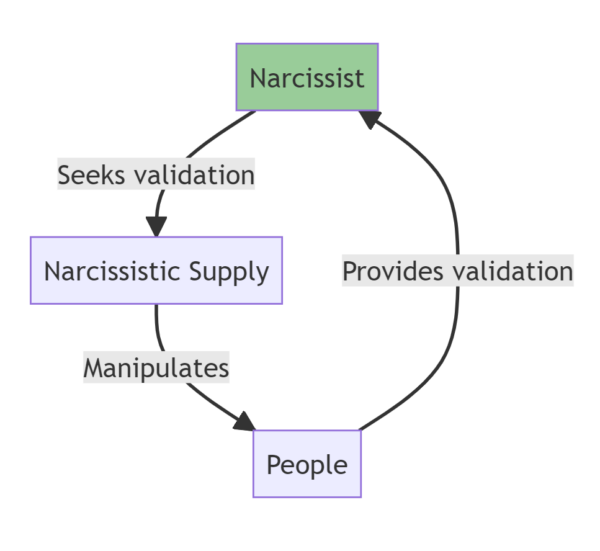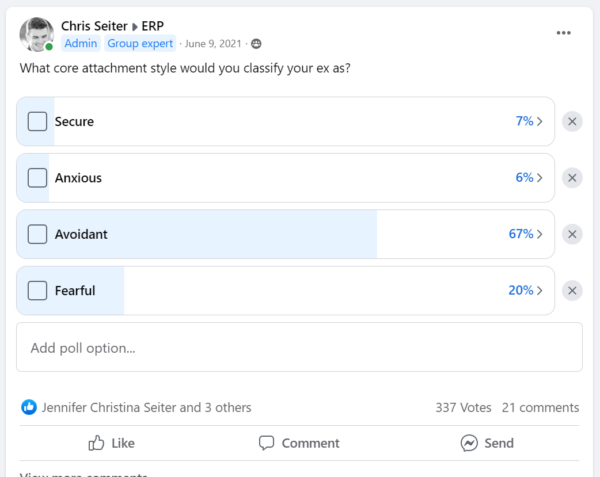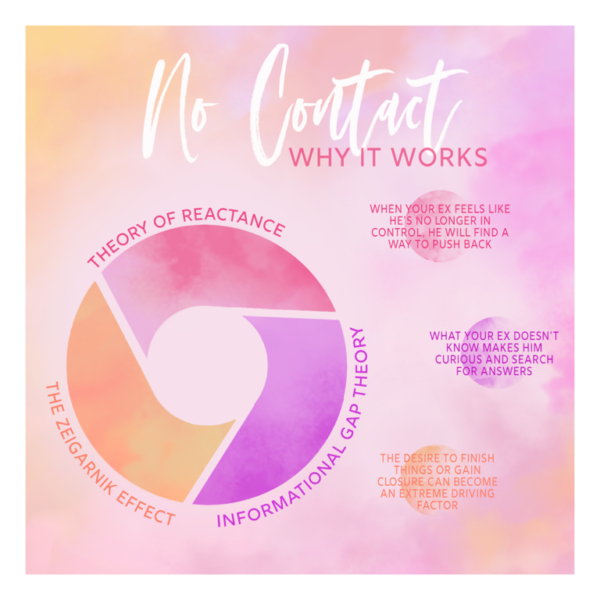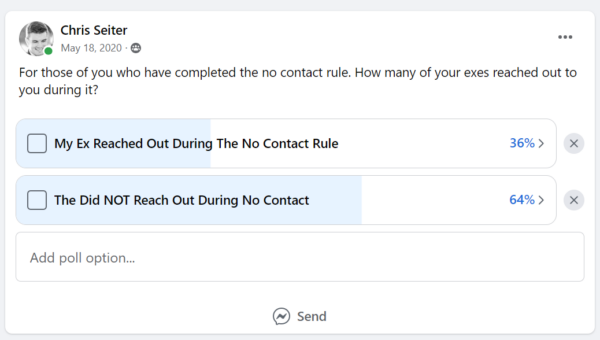Today I’m going to talk about how likely it is that an ex would be missing you if you aren’t talking to one another.
The likelihood of an ex missing you when you aren’t talking is influenced by various factors. This makes it incredibly challenging to give a definitive answer on if they are missing you are not.
However, what I can do for you is show you the major factors in play that makes it more likely for an ex to miss you.
There are seven in all,
- The Nature Of Your Breakup
- The Duration And Intensity Of The Relationship
- Their Current Life Circumstances
- Nostalgic Reverie
- The Presence Of Regret
- The No Contact Rule
- Social Media
As always, let’s get started!

What Are Your Chances of Getting Your Ex Boyfriend Back?
Take the quizFactor #1: The Nature Of The Breakup:
There are really two types of breakups that I want to focus on here:
- Amicable breakups
- Traumatic ones
Amicable Breakups:
If the breakup was mutual and done with understanding, there might be a higher chance that both parties miss each other due to the absence of hard feelings.
Painful/Traumatic Breakup:
If the breakup was due to cheating, betrayal, or any form of abuse, the person who felt wronged might be more focused on healing than missing the relationship. However, they might still miss the positive aspects or the potential they believed the relationship had.
Factor #2: Duration and Intensity of the Relationship:
The longevity and depth of a relationship can significantly influence the emotional aftereffects once it ends.
Relationships that have spanned a considerable duration of time often carry a multitude of shared experiences, memories, challenges, and growth phases. This rich tapestry of shared life can leave indelible marks on one’s psyche.
Intensity, too, plays a crucial role. Even relationships that were relatively short-lived can have a profound impact if they were intensely passionate or deeply connected on an emotional, intellectual, or spiritual level.
Such connections can be etched deeply into one’s memory. As a result, even years after parting ways, individuals might find themselves looking back, reminiscing about pivotal moments, or reflecting upon the nuances of their past relationship.
This doesn’t necessarily mean they haven’t moved on or that they harbor a desire to rekindle the relationship; rather, it’s a testament to the profound human ability to recall and treasure moments of deep connection and significance.
Factor #3: Current Life Circumstances:
This might not come as much of a surprise since it aligns with common sense.
If someone is feeling lonely or undergoing a challenging time, they are more likely to reminisce and long for past relationships.
A common scenario involves an ex reaching out after experiencing the death of an important family member. Such emotional turmoil can prompt them to revisit memories and even reach out for solace.
A similar emotional response can be triggered by significant changes like job loss, leading them to seek emotional support.
Yet, there’s an intriguing narcissistic dimension to this entire premise.
At the heart of this article, we’re essentially pondering, “Does my ex miss me even though we’re not in touch?” An interesting facet related to narcissists (and I’m not implying that your ex is one) is their preoccupation with the concept of “supply.”
A fitting analogy might liken narcissists to vampires. Whereas a vampire doesn’t regard a human as an individual but more as sustenance, narcissists perceive people as sources of validation, admiration, or even intimacy.
It’s curious to observe that if, for instance, your ex reaches out after losing their job, they might be doing so to extract the emotional support (or “supply”) they need from you, only to distance themselves once their need is met.
It’s essential to remain vigilant. If your ex’s pattern of reaching out seems solely predicated on their needs rather than genuine appreciation or goodwill, it’s worth taking note.

What Are Your Chances of Getting Your Ex Boyfriend Back?
Take the quizFactor #4: Nostalgic Reverie:
A few years ago, I produced a video titled “How to Make an Avoidant Ex Miss You”.
It’s the go-to recommendation for those unfamiliar with the behavior of avoidant individuals. This deep dive into how avoidant personalities function was underpinned by thorough research.
One significant finding revealed that avoidants tend to yearn for an ex-partner only when that person becomes unavailable—typically when they are out of the relationship and out of contact. This is because the absence of direct engagement ensures their deactivation systems aren’t set off. Without the looming threat of mutual feelings, especially once they presume an ex has moved on, avoidants are free from the engulfment fears. This freedom unlocks their dormant romantic tendencies. There’s an ironic pleasure derived from the fact that they can fully miss someone while simultaneously having their belief reinforced: the belief that people inevitably leave them.
From my observations, many exes our clients describe tend to exhibit dismissive avoidant tendencies.
This typically manifests as breaking off relationships whenever their sense of independence feels jeopardized.
A prevalent pattern I’ve noticed is that one of the most effective ways to make an avoidant ex pine for you is by granting them space and silence.
When they’re convinced you’ve moved on, that’s the juncture at which they allow themselves to indulge in reminiscences, succumbing to nostalgia and, often, idealizing you as the elusive “phantom ex”.
However, this only transpires when there’s no communication.
Conversely, if you constantly seek validation or closure from them, it instills the opposite belief in them. They perceive you as not having moved on, which risks casting you in the unfavorable role of the “clingy ex”, a label you’d surely prefer to avoid.
Factor #5: Presence of Regret:
If someone feels they made a mistake or took the relationship for granted, they might be more likely to miss their ex. This got me thinking. What are some examples where regret would be really likely?
Well, off the top of my head:
- Rushed Decisions: An individual might have ended the relationship impulsively, perhaps during a heated argument or due to external pressures, only to later realize that the decision was premature.
- Outside Influences: Sometimes friends or family might disapprove of a partner, leading one to question and eventually end the relationship. Over time, reflection can bring about the realization that they allowed others to unduly influence their personal choices.
- Prioritizing Career or Personal Ambitions: One might have prioritized career moves, educational pursuits, or personal projects over the relationship, leading to its end. With hindsight, they may feel the sacrifices they made in their personal life were not worth it.
- Fear of Commitment: An individual could have ended the relationship out of fear of commitment or anxiety about the future, only to later recognize that their fears were unfounded or that they lost someone truly special.
- Not Addressing Personal Issues: Some might have personal issues, such as mental health challenges, insecurities, or unresolved traumas that affected their behavior in the relationship. Post-breakup, they may undergo therapy or personal growth and realize that they projected their issues onto the relationship, leading to its demise.
- Taking the Partner for Granted: Over time, complacency can creep into relationships. An individual might neglect their partner’s needs, thinking they’ll always be there. After the breakup, the realization of not valuing the relationship enough when they had the chance can lead to profound regret.
- Infidelity: Cheating or getting emotionally involved with someone else can often seem like an answer during confusing times or moments of vulnerability. However, post the act, the weight of guilt and the loss of a once-loving relationship can make one deeply regret their actions.
Factor #6: No Contact Amplifies Feelings:
Going completely silent, or cutting off all communication, can often intensify feelings of longing.
This is primarily due to the sudden emptiness it generates.
While this may allude to the “no contact” rule and its association with the concept of reactance, there’s more to it.
Reactance is a psychological theory which posits that humans inherently possess certain behavioral freedoms. When these freedoms are restricted or taken away, individuals are more inclined to act in ways to reclaim them.
Applying the “no contact” rule to an ex essentially means stripping them of the freedom to communicate. Consequently, there’s a heightened probability they’ll attempt to reestablish this freedom. Anecdotal evidence from our clients has supported this theory.
However, it’s intriguing to note that many instances of exes reaching out, like the aforementioned, often stand as exceptions rather than norms.
While the “no contact” rule might potentiate an ex’s feelings or make them more inclined to miss you, in practice, the outcome might not align with expectations.
A survey I conducted a few years ago revealed that out of those who implemented the “no contact” rule, over 60% reported their ex didn’t initiate contact.
This observation correlates with our understanding that a significant portion of our clients’ exes exhibit dismissive avoidant tendencies. Dismissive avoidants are generally hesitant about making the first move.
Therefore, solely depending on the “no contact” rule in hopes of eliciting feelings of longing from an ex might not always yield the desired results, especially if the gauge of success is their likelihood of reaching out.

What Are Your Chances of Getting Your Ex Boyfriend Back?
Take the quizIt’s essential to recognize the limitations of the “no contact” rule. The way I advocate its use emphasizes personal growth and introspection. The more one fixates on the rule’s impact on an ex, the lesser its transformative power on oneself. The true potency of the “no contact” rule lies in its capacity to facilitate personal healing and growth.
Factor #7: Social Media:
In the contemporary digital landscape, merely catching a glimpse of an ex on social media can evoke a myriad of emotions.
Though there may be no direct communication, these indirect insights into one’s life can prompt feelings, possibly making an ex miss you.
At the psychological core of this lies cortisol, the stress hormone, which is released abundantly during breakups.
In typical stressful scenarios like disagreements, cortisol levels might spike but usually stabilize in three to four hours.
However, breakups are an exception. They can persistently elevate cortisol levels, leading to an almost perpetual anxious state. If this elevated cortisol state is sustained, it can be perceived as the “new normal”, with the body taking as much as six months to revert to actual normalcy.
Complicating matters is the omnipresence of social media.
Its algorithms, designed to captivate users and maximize time spent on platforms, often exacerbate post-breakup anxieties. Platforms such as Facebook identify and prioritize content based on user interaction. For instance, frequently checking an ex’s profile could lead the algorithm to prioritize their updates on your feed.
This relentless barrage of updates about an ex, particularly if they’ve moved on, can further elevate cortisol levels, prolonging the healing process.
Conversely, if an ex is inundated with your updates, they too might grapple with the inescapable presence of your digital shadow, leading them to reflect on their feelings and possibly miss you.
Instagram stories exemplify this dynamic. The feature allows users to see who viewed their stories. Many clients often inquire about the implications of an ex viewing all their stories. While it doesn’t provide definitive answers about their feelings, it does suggest that their cortisol levels remain elevated, making it conceivable that they could be missing you.




